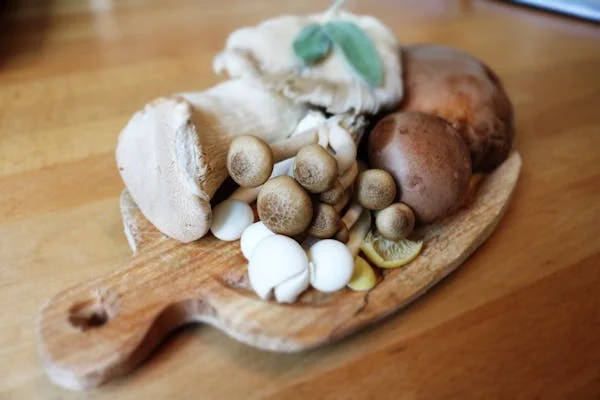Hey there! Just a heads up – some of the links on this blog are affiliate links. This means if you click on the link and make a purchase, I may earn a small commission at no extra cost to you. I only recommend products and services that I genuinely love and believe will add value to your life. Thanks for supporting my blog!
Table of Contents
In today’s fast-paced world, maintaining a robust immune system is essential for overall well-being.
With the constant barrage of environmental toxins, stressors, and pathogens, it’s more important than ever to support your body’s natural defense system.
While there are numerous factors that contribute to a healthy immune system, nutrition plays a pivotal role.
Incorporating specific superfoods into your diet can provide essential nutrients that enhance your immune function and overall health.
In this blog, we’ll explore 10 such superfoods that are easy to incorporate into your daily diet and can give your immune system the boost it needs.
10 Superfoods to Boost your Immune System
1. Citrus Fruits

Citrus fruits like oranges, lemons, grapefruits, and limes are renowned for their high vitamin C content.
Vitamin C is a potent antioxidant that helps support the immune system by stimulating the production of white blood cells, which are key players in fighting off infections.
Health Benefits
- High in Vitamin C: Vitamin C boosts the production of white blood cells, which are essential for fighting infections.
- Antioxidant Properties: Citrus fruits are rich in antioxidants that protect against free radicals.
- Skin Health: Vitamin C is important for healthy skin, which acts as a barrier against pathogens.
How to Use
Incorporate citrus fruits into your diet by drinking fresh-squeezed juice, adding slices to water, or including them in salads and desserts.
Check my recipes:
Vibrant Chickpea Quinoa Salad with Zesty Lemon-Tahini Dressing
2. Berries

Berries such as strawberries, blueberries, raspberries, and blackberries are packed with antioxidants, vitamins, and minerals.
These tiny fruits are particularly rich in flavonoids, which have anti-inflammatory and immune-boosting properties.
Health Benefits
- Antioxidants: Berries are high in antioxidants that protect cells from damage.
- Anti-inflammatory: They have anti-inflammatory properties that support immune health.
- Brain Health: Blueberries can improve brain function and may help prevent cognitive decline.
How to Use
Add fresh or frozen blueberries to smoothies, yogurt, and pancakes, or enjoy them as a snack.
Check my recipes:
Berry Bliss Whole Grain Pancakes
3. Garlic

Garlic has been used for centuries for its medicinal properties.
It is not just a flavorful addition to your meals; it’s a nutritional powerhouse packed with compounds that boost your immune system.
It contains compounds like allicin, a sulfur-containing compound found in garlic, which have been shown to enhance the disease-fighting response of certain types of white blood cells when they encounter viruses that cause the common cold or flu.
Incorporating garlic into your meals regularly can help fortify your immune defenses.
Health Benefits
- Antimicrobial Properties: Garlic has potent antimicrobial properties that help fight against various pathogens.
- Anti-inflammatory Effects: It reduces inflammation, which can support immune function.
- Cardiovascular Health: Garlic is known to improve heart health by lowering blood pressure and cholesterol levels.
How to Use
Incorporate garlic into your diet by adding it to soups, stews, sauces, and dressings.
For the most potent effects, crush or chop fresh garlic and let it sit for a few minutes before cooking.
4. Ginger

Ginger is another powerful immune-boosting superfood.
It is a root that has been used for centuries in traditional medicine.
It has anti-inflammatory and antimicrobial properties that can help ward off infections and reduce inflammation in the body.
Health Benefits
- Anti-inflammatory: Ginger’s anti-inflammatory properties help reduce inflammation and can relieve symptoms of various ailments.
- Antioxidant: The antioxidants in ginger help fight oxidative stress, which can weaken the immune system.
- Digestive Health: Ginger aids digestion and can help alleviate nausea and indigestion.
How to Use
Add fresh ginger to smoothies, teas, and stir-fries, or use ground ginger in baking and cooking for a spicy kick and health boost.
5. Yogurt

Yogurt is a probiotic-rich food that supports gut health, which is closely linked to immune function.
A healthy gut microbiome is essential for a strong immune system, as it helps regulate inflammation and promotes the production of immune cells.
Health Benefits
- Probiotics: Yogurt contains beneficial bacteria that improve gut health and enhance immune function.
- Rich in Nutrients: It provides essential nutrients like calcium, vitamin D, and protein.
- Digestive Health: Yogurt helps maintain a healthy digestive system, which is vital for overall health.
How to Use
Choose plain, unsweetened yogurt to avoid added sugars.
Add fresh fruits, nuts, and seeds for a nutritious and delicious snack.
6. Leafy Greens

Leafy greens like spinach, kale, and Swiss chard are nutritional powerhouses packed with vitamins, minerals, and antioxidants.
They are particularly rich in vitamin C, vitamin K, and folate, all of which play vital roles in immune function.
Health Benefits
- Rich in Nutrients: Leafy greens such as spinach, is packed with vitamins and minerals that support immune health.
- Antioxidant Properties: It contains antioxidants like beta carotene, which help fight infections.
- Supports Cellular Function: The nutrients in spinach are crucial for the functioning of immune cells.
How to Use
Add spinach to salads, smoothies, and soups.
Lightly steam or sauté spinach to preserve its nutrients while improving digestibility.
Check my recipes:
Spinach Banana Protein Smoothie
7. Turmeric

Turmeric, a bright yellow spice commonly used in Indian cuisine, contains curcumin, a compound with powerful anti-inflammatory and antioxidant properties.
Incorporating turmeric into your diet can help reduce inflammation in the body and support immune function.
Health Benefits
- Anti-inflammatory: Curcumin significantly reduces inflammation and can boost immune function.
- Antioxidant: Turmeric fights free radicals and supports overall health.
- Enhanced Immunity: Regular consumption of turmeric can enhance the body’s immune response.
How to Use
Turmeric can be added to curries, soups, and smoothies.
For better absorption, pair turmeric with black pepper, which contains piperine, a compound that enhances curcumin absorption.
Check my recipes:
Turmeric Chickpea and Spinach Curry
8. Almonds

Almonds are an excellent source of vitamin E, an antioxidant that helps protect cells from damage.
Vitamin E also plays a role in immune function by enhancing the activity of immune cells.
They also provide healthy fats, protein, and fiber.
Snacking on a handful of almonds or adding almond butter to your meals can help boost your immune system.
Health Benefits
- Antioxidant: Vitamin E in almonds helps protect cells from oxidative stress.
- Healthy Fats: The monounsaturated fats in almonds support overall health.
- Energy Boost: Almonds provide sustained energy and support metabolic health.
How to Use
Enjoy a handful of almonds as a snack, or add them to salads, oatmeal, and yogurt.
Almond butter is also a great alternative to traditional spreads.
Check my recipes:
9. Green Tea

Green tea is loaded with antioxidants called catechins and L-theanine, which have been shown to enhance immune function and reduce the risk of infections.
Drinking green tea regularly can help strengthen your body’s defenses against harmful pathogens.
Health Benefits
- Antioxidant: Green tea’s catechins protect against cellular damage.
- Immune Support: Regular consumption of green tea can enhance the body’s immune response.
- Mental Clarity: L-theanine in green tea promotes relaxation and improves focus.
How to Use
Enjoy a cup of green tea daily. For added benefits, consider adding a squeeze of lemon or a bit of honey.
10. Mushrooms

Mushrooms are fungi that have been used for their medicinal properties for centuries.
Certain varieties of mushrooms, such as shiitake, maitake, and reishi, have immune-boosting properties.
They contain beta-glucans, polysaccharides that have been shown to enhance immune function and increase the production of white blood cells.
Health Benefits
- Immune Modulation: Mushrooms contain beta-glucans, which are compounds that enhance the activity of immune cells.
- Antiviral and Antibacterial: Certain types of mushrooms, like reishi, have antiviral and antibacterial properties.
- Rich in Selenium: Mushrooms are a good source of selenium, a mineral that plays a role in immune response.
- Antioxidant Properties: They contain antioxidants like ergothioneine and glutathione, which protect cells from damage.
How to Use
Add mushrooms to soups, stir-fries, salads, and omelets.
They can be sautéed, grilled, or roasted for a delicious and nutritious addition to any meal.
For a potent immune boost, consider incorporating medicinal mushroom extracts into your diet.
Check my recipes:
Spinach and Mushroom Omelet with Whole Grain
Conclusion
Incorporating these 10 superfoods into your diet can help bolster your immune system and keep you healthy year-round.
Whether you’re enjoying a citrus-infused salad, sipping on a cup of green tea, or adding mushrooms to your stir-fry, making these nutritious choices can have a profound impact on your overall well-being.
Remember, a healthy immune system starts with a healthy diet, so make sure to prioritize nutrient-rich foods to support your body’s natural defenses.
References
- https://www.verywellhealth.com/the-benefits-of-allicin-88606
- https://www.news-medical.net/life-sciences/What-are-Catechins.aspx




0 Comments